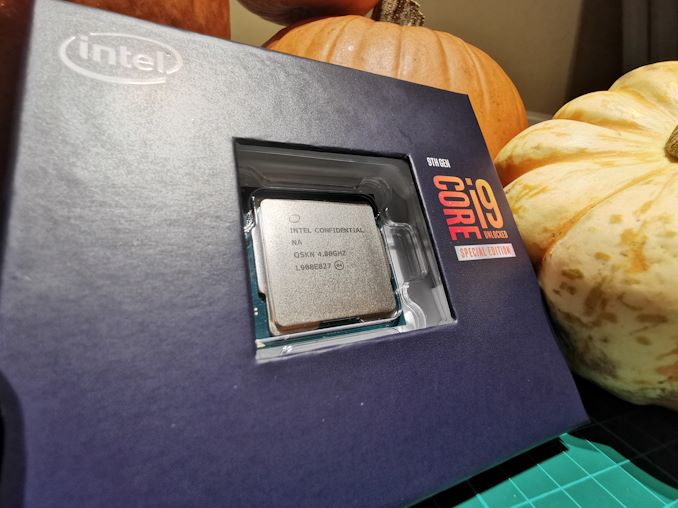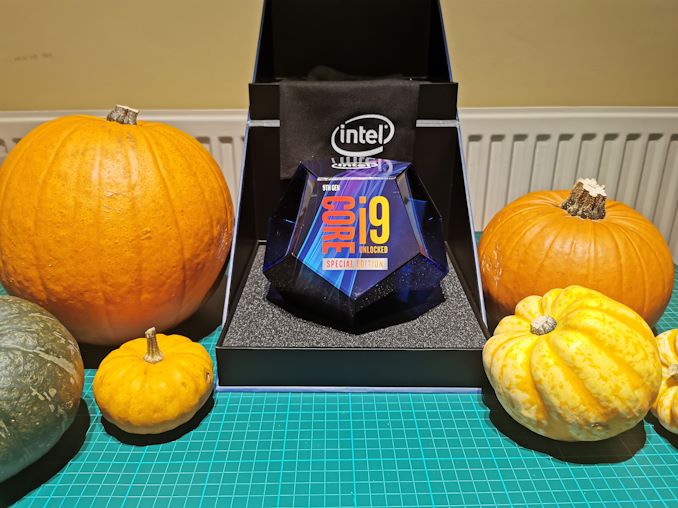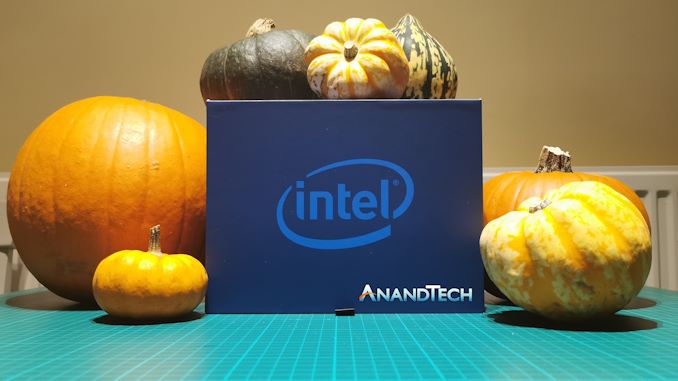The Intel Core i9-9900KS Review: The 5 GHz Consumer Special
by Dr. Ian Cutress on October 31, 2019 10:45 AM ESTConclusion
The Intel Core i9-9900KS is Intel’s first consumer level all-core 5.0 GHz processor. Technically Intel has launched an all 5.0 GHz processor before: earlier this year the Core i9-9990XE was launched into the high-frequency trading market, which had 14 cores at 5.0 GHz, but that part is an auction only part for select business partners. What the Core i9-9900KS does is bring the same principle down to a more consumer friendly core count and a more consumer friendly price point. The tray price is set at $513, although it’s likely to be sold for much more than that.
Playing To Power
One of the key elements I wanted to test in this review is how the chip responds to Turbo. As we’ve discussed at length, and confirmed by Intel: the guidelines for the Turbo settings are not set in stone. Intel actively encourages its motherboard partners to increase these settings if the motherboards are over-engineered to be able to do so. This means that a high-end motherboard should be able to give a longer turbo than a cheap board.
A longer turbo might not mean much. When the turbo budget has run out, the system will limit the chip to the TDP setting in the BIOS (which should be the one on the box), and will try and maximise the frequency for the power limit. On a lot of chips, this means you still have a very high frequency, nowhere near the base frequency. But the power limit does have benefits such as acting as a thermal control at least.
In our test, we used MSI’s Z390 Gaming Edge AC. It’s a mid-upper motherboard, but it set our Core i9-9900KS to have a TDP and turbo power limit of 255W. Intel’s ‘guidelines’ state a TDP of 127 W and a turbo power limit of 159 W. When comparing the two, there are some distinct advantages for the 255W setting, such as 10%+ performance on rendering, but the 159W setting does afford 10C lower temperatures in those heavy workloads. Ultimately, as the name TDP = Thermal Design Power implies, it all comes down on your ability to cool the chip.
For gaming, the turbo budget didn’t seem to matter at all, except in a few tests at super low resolution and settings.
One question that does remain however, is which set of results should we keep? The 255W results are what we get out of the box, and the 159W results are only 'Intel guidelines that Intel expects none of the board manufacturers to keep to'. Ideally we keep both, but that's a mess in its own right.
Planning Against The Competition
There’s no getting around giving Intel kudos for binning enough processors to commercially sell an all-core 5.0 GHz chip. In our benchmarks, we see it steaming ahead of any other consumer grade processor when it comes to single core performance. Users are likely to be able to push that single (or dual) core turbo a bit higher as well, although the power limits should be monitored.
It should be noted that in most cases, the Core i9-9900KS either matched or excelled against the previous king of Intel’s consumer desktop line, the Core i9-9900K. There were a few select instances, namely benchmarks like Handbrake, DigiCortex, F1 2018, and 7-zip, where we did see performance regressions that we weren’t expecting. We’re going to have to go back to Intel to see exactly what these are. But they seem confined to very specific workloads.
Overall, the Core i9-9900KS is Intel’s best ever consumer processor.
In ST performance metrics, it wins. In variable threaded metrics, it either wins or does really well. In MT performance metrics, it depends on how strong AMD’s 12-core hardware really is, and how multithreaded the calculation really is. As Intel slowly adds AVX-512 to its consumer line, as it is with Ice Lake, then the MT competition is going to be really interesting.
Only Available For A Short Time Only
While the Core i9-9990XE is a 14-core 5.0 GHz chip, it is an OEM only part sold by Intel at auction only, whereas the Core i9-9900KS should experience wider availability at retail, albeit for a limited time.
Our colleagues at Tom’s Hardware reported that Intel stated in a promotional video that the processor would only be available during the holiday season of 2019 – or at least that the stock level would not be replenished after the holiday season. When we approached Intel asking for confirmation, we were told:
This special edition processor will be available for a limited time only. It can be found at retailers worldwide. We are not disclosing unit quantity information. However, the Core i9-9900KS will have very limited availability.
There is no doubt that there will be some CPUs available into 2020, however it would appear that Intel is only making one main batch of hardware, and once it has gone, it has gone. This might make the $513 tray price that Intel is putting on the part a bit of a misnomer, as retailers might take advantage of this. This will take the shine off the Core i9-9900KS a little, as at $529 or so it would easily be recommended over a Core i9-9900K. If it goes to $599 or $649 because of its limited release, then it becomes less of an interesting buy.
Ultimately the Core i9-9900KS is going to end up in the hands of enthusiasts who want nothing more than the best, but don’t want to jump to the high-end desktop platform. Despite the Intel chipsets for consumers, it’s still a shame that these processors only have 16 PCIe 3.0 lanes, given the desire for direct attached PCIe storage in this market.













235 Comments
View All Comments
AshlayW - Friday, November 1, 2019 - link
'Hater's dislike this CPU because once again Intel is relying on marketing ploys and borderline mis-information to sell recycled parts based on tech from 2015, at a price that is higher than the competition's part with 4 more cores, signficnatly higher MT perf, higher efficiency, an included cooler, it's not EOL like Z390, etc. Do you see what I'm saying? these 'haters' are sick and tired of Intel's stranglehold on price-gauging the CPU market and they voice their opinions now that we have some really viable competition. Shocker: people care about value and features.nathanddrews - Friday, November 1, 2019 - link
And to some customers, this chip has the features they want at a value level they can afford. I'm not sure why that's so difficult a concept to understand. Rather, I think that the "haters" understand perfectly well, they irrationally fear what other people purchase.Spunjji - Friday, November 1, 2019 - link
None of what you said discounts what he said - it's just whataboutism followed by some unflattering generalisations about people you think you disagree with. :|GreenReaper - Saturday, November 2, 2019 - link
It's not fear; it's pity.brantron - Thursday, October 31, 2019 - link
What does the ring bus clock run at by default? If it's still 3.7 - 4 GHz, these may be a little more overclockable than the turbo clock implies.I'm curious how the power and temperature compares to the regular 9900K with everything pushed as far as it will go.
If and when there's a desktop Comet Lake, I'd also like to see a comparison from Skylake and on. With chiplets, CPU manufacturing processes may no longer completely go out of style, so it would be interesting to see how 14nm progressed over 5 years.
Alistair - Thursday, October 31, 2019 - link
It's kind of funny, that the only thing different about this 9900k is the possible voltage that it might be able to run at, and he didn't test that. "voltage" is nowhere to be found in this review. I.e. this CPU is just a 9900k, nothing improved. Just set your voltage to 1.3V with a normal 9900k and set 5ghz, there, the same. This by all rights will be crushed by the 3950x, I'd rather take double the cores for almost the same money, imo.TEAMSWITCHER - Thursday, October 31, 2019 - link
"I'd rather take double the cores for almost the same money".I jumped on the 9900K long before Zen 2 even had a release date. I'm not disappointed with the performance I get in multi-threaded tasks, certainly not enough to spend $1000 to switch platforms. AMD's 3900X and (eventually) the 3950X might have more cores but it's going to be at least two years before I buy another platform. Instead, I will use that $1000 to purchase an RTX 3080Ti the very instant nvidia puts them up for sale.
Korguz - Thursday, October 31, 2019 - link
heh,.. and you really think nvidia is going to charge 1k for a 3080Ti ??? more like 2000+Alistair - Thursday, October 31, 2019 - link
um... you could have just kept the 8700k instead if you wanted the ST performance, that hasn't changedTEAMSWITCHER - Friday, November 1, 2019 - link
What makes you think I had an 8700K? My previous platform was an Intel Core i7 5930K on an X99 Deluxe motherboard. The jump from 6 - 8 cores wasn't huge, but the Coffee Lake cores are faster than the Haswell-E - my Cinebench score still doubled. However, Cinebench is kind of stupid now, and why I dropped the HEDT platform. I'd rather spend more on a GPU, not just for great 4K gaming, but Blender can do faster rendering on a GPU, and you can also use your GPU to accelerate video encoding. 8 cores and 16 threads is plenty for everything else.